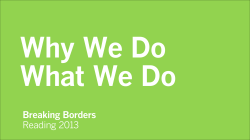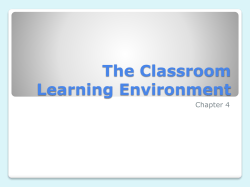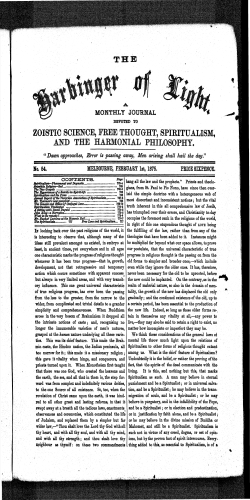
THE 8 HABIT TH From Effectiveness to Greatness
THE 8TH HABIT From Effectiveness to Greatness By: Stephen R. Covey The PAIN, The PROBLEM, The SOLUTION • The world, though, is a vastly changed place. The challenges and complexity we all face un out relationships, families, professional lives, and communities are of an entirely new order of magnitude. • Being effective as individuals and organizations is no longer merely an option – survival in today’s world requires it. But in order to thrive, innovate, excel and lead in what Covey calls the Knowledge Worker Age, we must build on and move beyond effectiveness. The call of this new era in human history is for greatness; it’s fulfillment, passionate execution, and significant contribution. • Accessing the higher levels of human genius and motivation in today’s new reality requires a sea change in thinking: a new mind-set, and new skill-set, a new tool-set – in short, a whole new habit. The 8th Habit shows how to solve such common dilemmas as: • People want peace of mind and good relationships, but also want to keep their lifestyle and habits. • Relationships are built on trust, but most people think more in terms of “me” – my wants, my needs, my rights. • Management wants more for less; employees want more of “what’s in it for me” for less time and effort. • Business are run by the economic rules of the marketplace; organizations are run by the cultural rules of the workplace. • Society operates by its dominant social values, but must live with the consequences of the inviolable operation of natural laws and principles. The PAIN People become dissatisfied with their jobs for various reasons. These reasons include stress, pressure, terrible bosses, feelings of frustration, and a host of other things. Overworked, underpaid and underappreciated employees end up affecting the productivity and effectiveness of an organization adversely. The PROBLEM Our basic management practices come from the Industrial Age. These include: The belief that you must control people; Our view of accounting (People are an expense; machines are assets.) The carrot-and-stick motivational philosophy; and Centralized budgeting, which creates hierarchies and bureaucracies. New developments in technology and globalization have ushered in changes in the way people think and operate. The 20th century was known as the Industrial age. As the new millennium unfolds, civilization is now moving towards a new age – the age of information or the Knowledge Worker Age. This is where the problem begins. This paradigm leads to a culture of co-dependency and compliancy. In this culture, a worker loses his voice because he believes that his views are not significant enough. The SOLUTION Find your voice: Recognize and develop your true nature. Express your voice through vision, discipline, passion and conscience. Inspire others to find their own video. Live and set an example of what you have learned. Find Your Voice Discover your voice – unopened birth-gifts • Each individual is born with the potential to be great. What you do with this potential is up to you. You must remember that the more you use and expand your present talents, the more capacity you are given, and the greater your ability becomes. THREE MOST IMPORTANT GIFTS Freedom and power to choose. -You have the power to direct your own life based on your values. Natural laws or principles. -These are universal, timeless, inarguable principles that transcend culture and geography. These principles include kindness, fairness, and honesty. Four intelligences/capacities Mental Intelligence (IQ) Physical Intelligence (PQ) Emotional Intelligence (EQ) Spiritual Intelligence (SQ) You can develop the four intelligences by assuming… For the mind – assume that the half-life of your profession is two years; now prepare accordingly. 2. For the body – assume that you have a heart attack; now live accordingly. 3. For the heart – assume that everything you say about another can be overheard; now speak accordingly. 4. For the spirit – assume that you have to attend a one-on-one meeting with God every quarter; now live accordingly. 1. All great achievers have expanded their four innate human intelligences and capacities into: Express your voice – vision, discipline, passion and conscience. Vision (mental) Seeing with your mind what is possible in yourself, in people, causes endeavors, and enterprises. 2. Discipline (physical) Commitment – bringing vision into reality. 1. Passion (emotional) It is the fire or the drive that sustains the discipline to achieve the vision. 3. Express your voice – vision, discipline, passion and conscience. Conscience (spiritual) The guiding force – the moral compass of what is right and wrong. 4. These expressions represent the highest means of expressing your voice. Whole Person Four Needs Four Capacities Four Abilities Voice Body To live PQ Discipline Need Mind To learn IQ Vision Talent Heart To love EQ Passion Passion Spirit To live a legacy SQ Conscience Conscience Inspiring others to find their voice – the leadership challenge. • Leadership is defined as communicating to people their worth and potential so clearly that they come to see it in themselves. In other words, a leader inspires others to develop their potential and be the best they can be. Management and Leadership Leadership and management are both important in an organization. In fact, one can not be effective without the other. You must, however, learn to differentiate between the two. Leaders enable a person to be the be the best that he could possibly be. Leaders empower people. Managers, on the other hand, run corporations. Managers organize. Chronic Problems Acute Symptoms Spirit Low trust Backbiting, in-fighting, defensiveness, information hoarding Mind/Vision No shared vision Hidden agendas, playing political games, using different criteria in decision making Body No alignment/discipline in organization structure Misalignment with employees, marketplace and suppliers, interdepartmental rivalry Heart Disempowerment Boredom, fear, anger, apathy, moonlighting CHRONIC AND ACUTE PROBLEMS An organization, like a person, has two kinds of problems – the chronic (continuing, underlying and casual) and the acute (painful, symptomatic and debilitating). Above are ways on predicting four chronic problems of an organization and their acute symptoms. 1. Modeling (conscience/spirit): setting a good example. 2. Pathfinding (vision/mind): jointly determine the course. 3. Aligning (discipline/body): set up and manage a system to stay in course. 4. Empowering (passion/heart): focus on results, get out of people’s way, give advice when requested. Leadership response (four roles of leadership) The voice of influence – be a trim tab The center of any leadership method is modeling. Modeling is not the work of a sole individual. Rather, it must be the job of the entire team. Group identification is based in involvement, whether directly or indirectly. What is a trim-tab? A trim-tab is a “rudder on the rudder” of a ship. It is what makes it easier to turn the rudder, and, in turn, easier and quicker to turn the ship. Seven levels of initiative or self-empowerment 1. Wait until you are told. 2. Ask. 3. Make a recommendation. Five basic steps to making a recommendation: Step one: analyze the problem. Step two: come up with alternative and recommended solutions. Step three: develop recommended steps to execute the solutions. Step four: incorporate an awareness of all realities. Step five: make a recommendation in a way that only requires approval by a single signature. 4. I intend to. 5. Do it and report immediately. 6. Do it and report periodically. 7. Do it. The voice of trustworthiness – modeling character and competence. A leader’s character can make or break an organization. A person with integrity and one who is trusted by his peers and employees will be seen as a good leader. Trustworthiness is an important factor in any relationship – personal and professional. It is the glue that holds together a family and an organization. Personal trustworthiness • Trustworthiness comes from character and competence. There are three aspects of character that build trustworthiness: 1. Integrity: you incorporate principles and natural laws when dealing with people. You are honest and you keep promises made to yourself and to others. 2. Maturity: you can deal with difficult issues with compassion. 3. Abundance mentality: you see life as full of opportunities. You don’t compare yourself with others and you are sincerely happy for other people’s success. The three aspects of competence are Modeling is living The 7 Habits of Highly Effective People 1. Technical competence: the skill and knowledge required to finish a task. 2. Conceptual knowledge: the ability to see the big picture. 3. Interdependency: the awareness that everything in life is interconnected. 1. 2. 3. 4. 5. 6. 7. Be proactive. Begin with the end in mind. Put first things first. Think win-win. Seek first to understand, than to be understood. Synergize. Sharpen the saw. The voice of speed and trust • Seeking to expand the circle of influence and inspiring others to find their voice means that you to build strong relationships. The higher the trust one earns, the easier it would be for you to communicate with people. Blending voices – searching for the third alternative • The Win-Win mind set is the principle behind the third alternative. It is not important for both parties to think winwin. Only one party has to believe in this mind set. That one party must prepare the other party by practicing empathy and deep listening until the other party feels trust. Deposits Withdrawals Sacrifice Required Internalized Principles Seek first to understand Seek first to understand Impatience, ego, your agenda Mutual understanding Keeping Promises Breaking Promises Moods, feelings, emotions, time Integrity/execution Honesty, openness Smooth manipulation Ego, arrogance, control Vision/values, integrity/execution, mutual understanding Kindness, courtesies Unkindness, discourtesies Self-time, perception, stereotypes, prejudices Vision/values, integrity/execution Win-win or no deal thinking Win-lose or lose-win thinking ‘Winning means to beat” competitiveness Mutual respect/benefit Clarifying expectations Violating expectations Kiss-up style communication Mutual respect/benefit mutual understanding, creative cooperation, renewal Loyalty to the absent Disloyalty, duplicity Some social acceptance, heart message Vision/values, integrity/execution Apologies Pride, conceit, arrogance Ego, arrogance, pride, time Vision/values, integrity/execution Receiving feedback and giving “I” messages Not receiving feedback and giving “you” messages Ego, arrogance, pride, reactive communication Mutual understanding Forgiveness Holding grudges Pride, self-centeredness Vision/values, integrity/execution The table above illustrates what Covey calls the Emotional Bank Account. These ten key deposits or withdrawals can either destroy or build relationships. The skill set of searching for the third alternative O The most important skill in life is communication and this can be broken down into four categories – reading, writing, speaking and listening. Of the four, listening represents 40 to 50 percent of communication time. Unfortunately, only a miniscule percentage of people have been trained formally on how to listen. O Below are the five levels of listening: 1. Ignoring. 2. Pretending to listen. 3. Selective listening. 4. Emphatic listening. 5. Attentive listening. THE AGE OF WISDOM 1. 2. 3. 4. The 8th Habit gives you the key to understand and unleash both your own potential and the potential of the other people around you. As a review, you must remember what part each role plays and their importance. Modeling Pathfinding Aligning Empowering Six Core Drivers to Execution 1. 1. 2. 3. 4. 5. 6. Clarity Commitment Translation Enabling Synergy Accountability 2. 3. 4. The four disciplines of execution Focus on the wildly important. Create a compelling scoreboard. Translate lofty goals into specific action. Hold each other accountable all of the time. The seven habits you have learned from Stephen Covey’s previous book are still irrelevant. However, the Knowledge Worker Age calls for the need of an 8th Habit that can help you further in your journey towards personal and organizational excellence. THE END
© Copyright 2026













